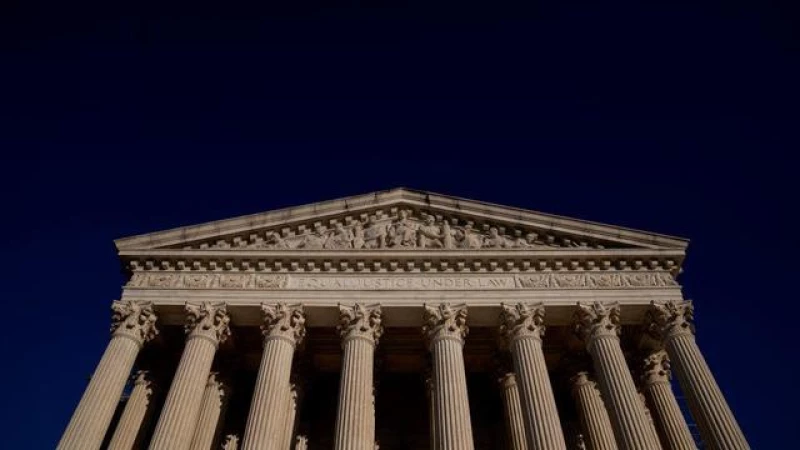Supreme Court Rejects First Amendment Challenge to Conversion Therapy Ban
Washington — The Supreme Court on Monday turned away a First Amendment challenge to a Washington state law that bars licensed health professionals from practicing conversion therapy on minors.
The decision from the high court not to take up the appeal from Brian Tingley, a licensed marriage and family counselor in Washington, leaves intact a lower court opinion upholding the law. Justices Clarence Thomas, Samuel Alito and Brett Kavanaugh said they would grant the request to hear Tingley's case.
Thomas wrote in a dissenting opinion that there is "little question" that Washington's law regulates speech and implicates the First Amendment. He argued that under the measure, licensed counselors can only convey a "state-approved message of encouraging minors to explore their gender identities."
"Expressing any other message is forbidden — even if the counselor's clients ask for help to accept their biological sex," Thomas wrote. "That is viewpoint-based and content-based discrimination in its purest form."
In a separate dissent, Alito said that the case raises a question "of national importance." Noting the number of states with laws restricting the practice of conversion therapy, he wrote that "it is beyond dispute that these laws restrict speech, and all restrictions on speech merit careful scrutiny."
Washington's conversion therapy ban
The measure at issue in the case, known as SB 5722, was enacted in 2018 and prohibits licensed therapists from performing conversion therapy on patients under the age of 18 in their professional capacity. Conversion therapy is defined under the law as a "regime that seeks to change an individual's sexual orientation or gender identity."
Washington's measure doesn't prevent licensed therapists from expressing their views about conversion therapy with minor clients, recommending it be performed by others such as religious counselors or promoting it in public or private, according to court papers.
Tingley, a practicing Christian who believes that sex is assigned at birth and should not be changed, has worked as a licensed marriage and family therapist for more than 20 years. He sued Washington officials in 2021 and sought to block enforcement of the conversion therapy ban, arguing it violated his First Amendment rights by restricting his speech based on its viewpoint and content.
A federal district court granted a request by the state to dismiss the suit, and a three-judge panel for the U.S. Court of Appeals for the 9th Circuit affirmed the dismissal.
"Washington's licensing scheme for health care providers, which disciplines them for practicing conversion therapy on minors, does not violate the First or Fourteenth Amendments," Judge Ronald Gould wrote for the 9th Circuit panel. "States do not lose the power to regulate the safety of medical treatments performed under the authority of a state license merely because those treatments are implemented through speech rather than through scalpel."
Supreme Court to Consider Case on Conversion Therapy Law
After the full 9th Circuit declined to rehear the case, a counselor named Tingley has appealed to the Supreme Court. Represented by the Alliance Defending Freedom, a conservative legal organization, he argues that the panel's decision has "devastating real-world consequences," as young people with gender dysphoria who live in states with laws similar to Washington's will be deprived of care.
"Tingley's clients seek his counsel voluntarily because they want the help his viewpoint provides," his lawyers told the court in a filing."Yet the Law forbids him from speaking, treating his professional license as a license for government censorship."
They argued that Tingley lives in "continuous fear of government persecution," and is at risk of being targeted by "a single activist" who can accuse him of violating the conversion therapy law.
"A private conversation is speech, not conduct. And that does not change just because one participant is a licensed counselor and the other his client," Tingley's attorneys wrote. "Otherwise, government can alchemize almost any professional's speech into conduct that can be silenced — something the First Amendment forbids."
Washington state officials, though, urged the Supreme Court to leave the 9th Circuit's decision, as it has held for decades that states can regulate conduct by licensed professionals, even if those rules "incidentally impact speech."
State Attorney General Robert Ferguson stated that Tingley is the sole licensed therapist in Washington who has claimed harm from the law. Ferguson also mentioned that any licensed therapist who wishes to perform conversion therapy on minors can do so in other capacities, such as through religious counseling. Furthermore, numerous major medical and mental health associations have rejected conversion therapy, and 26 states along with the District of Columbia have limited the practice on minors, according to a filing with the court.
"In summary, SB 5722 safeguards children and youth from ineffective and harmful treatments conducted by licensed professionals authorized by the state," Ferguson explained. "The law does not prohibit licensed health professionals from discussing or recommending conversion therapy to their minor clients, or expressing their opinions on sexual orientation and gender identity in general."







